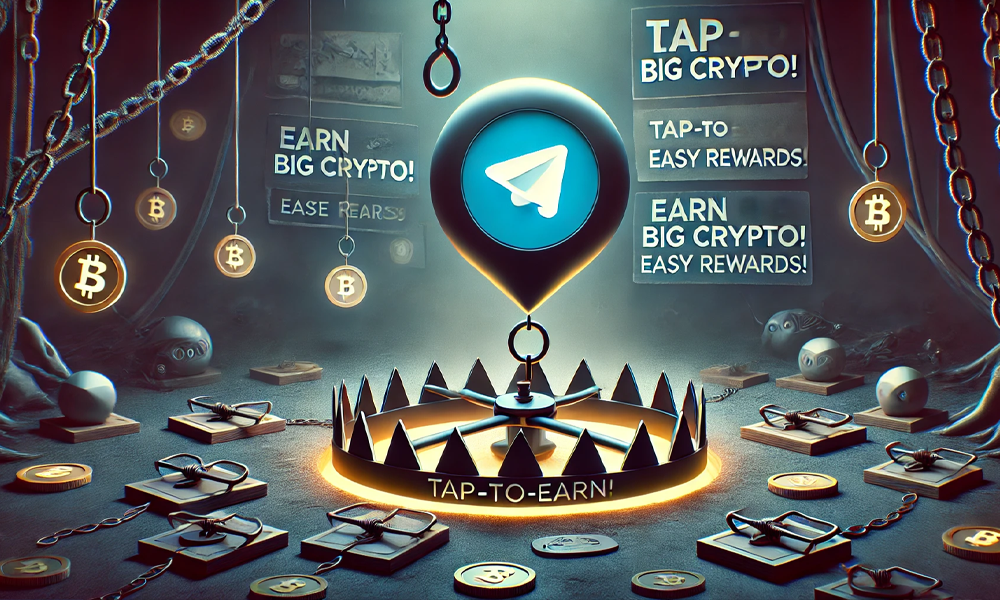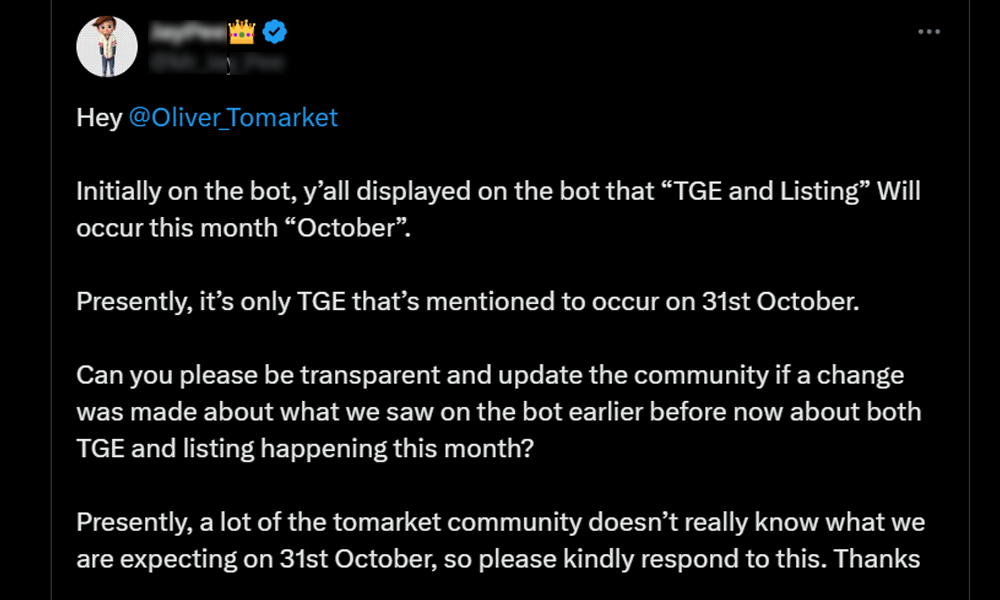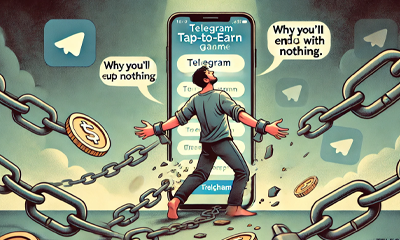In the world of crypto, there’s no shortage of creative ways to earn, and one of the latest trends is “Telegram tap-to-earn games”. These games entice users by offering crypto rewards for simple tasks—tapping buttons, completing in-game challenges, or inviting friends to join.

On the surface, it might sound like an easy way to earn crypto. But the reality is often very different.
Many of these Telegram games are riddled with scams, deceptive practices, and low-value rewards that rarely translate into meaningful earnings.
Here’s a deep dive into why Telegram tap-to-earn games may not be the best choice if you’re serious about earning crypto.
1. Scam-Infested: Most Tap-to-Earn Projects are Outright Scams
One of the biggest issues with Telegram tap-to-earn games is the high prevalence of scams. While these games may appear simple and harmless, many have been designed specifically to exploit players’ interest in earning crypto.

Here are some of the ways these scams operate:
- Fake Rewards: Many tap-to-earn games lure players with promises of crypto rewards that don’t exist. Players spend time tapping, completing tasks, and sometimes even paying for in-game upgrades, only to find out that the promised rewards are unattainable.
- Phishing Tactics and Data Harvesting: Some of these games collect users’ personal data under the guise of registration or wallet integration, making players vulnerable to phishing attacks. The collected data can be misused to target players for other scams or sold to third-party companies for profit.
- Vanishing Projects: Many Telegram tap-to-earn games have a short lifespan, staying active only long enough to gather user data and money from in-game purchases before disappearing. Once the game creators have made their profit, they abandon the project, leaving players with worthless in-game rewards and no recourse.
Because scams are so prevalent in the tap-to-earn space, users are advised to be cautious and research any project thoroughly before committing their time or money.
2. Deceptive Practices: Fake TGEs and Listing Dates
Another common tactic used by these games is to advertise upcoming “Token Generation Events (TGEs)” or listing dates on exchanges, creating excitement and a sense of urgency among players. However, these promised dates are often fraudulent or endlessly postponed.

Here’s how these tactics work:
- Fake TGEs (Token Generation Events): Tap-to-earn games often claim they are preparing for a TGE or launching a new token. These events are hyped up to convince users that the tokens they’re accumulating will soon be worth real money. However, the TGE dates are frequently pushed back or simply canceled, leaving players with useless tokens.
- Listing Date Delays and Manipulation: Some games claim they will list their token on exchanges by a certain date, allowing players to trade or sell their in-game rewards. But when the date arrives, the listing is delayed or canceled, or the token is only listed on obscure exchanges with no liquidity. This cycle of fake listings keeps players hopeful but leaves them with little to no return.
These deceptive practices are a calculated way to keep players engaged and spending without ever delivering any tangible rewards.
3. Community Farming: Extracting Stars and TON Tokens From Users
Many Telegram tap-to-earn games are designed to “farm” their communities, milking users for as much as possible without offering real value in return.

Here’s how they exploit their player base:
- Milking “Stars” and TON Tokens: A common feature in these games is an in-game currency, often referred to as “Stars” or similar tokens, which players can earn or purchase. To accelerate earnings, some games encourage players to spend TON (Telegram’s native cryptocurrency) on premium upgrades or additional stars. However, these upgrades rarely provide any real advantage, and players end up spending more than they can ever hope to recoup.
- Ads and In-Game Purchases: Many games are packed with ads, generating ad revenue for developers while providing users with meager rewards. In-game purchases, which promise to increase earnings or speed up progress, often serve as another cash grab, with no guarantee of any payout for the player.
- Referral Programs as a Growth Strategy: Referral programs incentivize players to bring in new users, allowing the game to grow its user base without investing in advertising. This tactic helps farm a larger community without offering genuine rewards to the players. In effect, users are encouraged to invite friends and family to join, only to expose them to the same exploitative practices.
The ultimate goal of these games is to generate as much revenue as possible through user engagement and in-game purchases without delivering on their promises of crypto rewards.
4. Small Airdrop Allocations: Big Rewards Reserved for Partners and Influencers
Another frustrating reality of tap-to-earn games is that they tend to allocate smaller amount of their tokens to actual players – those that login daily, complete tasks and perform other shits.
The majority of the token supply is often reserved for partners, early investors, and influencers who promote the game.

Here’s why this practice harms regular players:
- Unbalanced Token Distribution: When most of a token’s supply is held by a small number of insiders, those tokens become a tool for manipulation. Partners and influencers can drive up interest in the token, only to sell off their holdings once it reaches a peak, leaving regular players with devalued assets.
- Community Airdrop Allocation is Often Insignificant: Even when players receive airdrops, they’re often so small that the value is negligible. This is compounded by the fact that the token’s utility is limited or nonexistent, so the airdropped tokens have no real value in the long run.
- Promotion Over Long-Term Value: Many of these games focus more on short-term promotion, using influencers and early adopters to generate hype. However, there is little emphasis on building an actual product or ecosystem that would support long-term value, leaving regular players with a token that has no demand and rapidly loses value.
This approach leaves players with nothing more than the illusion of potential earnings while partners and influencers pocket most of the real benefits.
5. Tokens With No Utility: Value Diminishes Over Time
For any cryptocurrency to hold value, it needs utility—real-world use cases or integration within a larger ecosystem. Unfortunately, most tokens from tap-to-earn games have no utility whatsoever, making them virtually worthless.

Here’s why these tokens quickly lose any value they may have had:
- Lack of Real Use Cases: Unlike legitimate projects that create tokens for governance, staking, or payments, tap-to-earn game tokens are usually limited to in-game use. Since they can’t be used outside the game, they have no inherent value beyond what the game creators assign to them.
- No Liquidity or Market Support: Even if these tokens are listed on an exchange, they typically suffer from low liquidity and limited market demand. This makes it difficult for players to sell or trade their tokens for any meaningful amount, as few buyers are interested in low-utility tokens.
- Diminishing Value Over Time: As more players join and attempt to cash out, the token supply increases, but with no utility or demand, the token’s value falls. Any rewards that players accumulate diminish in value over time, leaving them with tokens that are practically worthless.
Without real-world applications or robust market support, these tokens have little chance of ever becoming valuable, making the time and effort spent on tap-to-earn games a poor investment.
The Bottom Line: Why Tap-to-Earn Games are Not Worth Your Time
Telegram tap-to-earn games are structured in a way that benefits the developers and early partners at the expense of the community. While they offer a tempting premise—easy crypto rewards for minimal effort—the reality is often disappointing and exploitative.
Here’s a summary of the main reasons why these games aren’t worth your time:
- Scam-Infested Landscape: With so many tap.to.earn games operating as scams, there’s a high risk of falling for empty promises and phishing schemes.
- Deceptive Practices: Fake TGEs, listing dates, and manipulated incentives keep players hopeful without ever delivering real rewards.
- Community Farming for Profit: Many games prioritize extracting money from players through in.game purchases and premium upgrades rather than providing genuine value.
- Unfair Token Distribution: The majority of tokens go to partners and influencers, leaving regular players with small, nearly worthless airdrops.
- Low-Utility Tokens: Without utility or demand, any tokens earned in these games quickly lose value, rendering players’ efforts practically meaningless.
Alternatives to Earn Crypto in Meaningful Ways
If you’re serious about earning crypto, consider more legitimate and valuable alternatives:
- Freelancing on Crypto Platforms: Sites like CryptoJobs, Upwork, or Fiverr offer freelance work that pays in cryptocurrency, providing real compensation for your skills.
- Staking and DeFi Opportunities: Many established cryptocurrencies offer staking or decentralized finance (DeFi) options, where you can earn passive income through reliable projects.
- Participating in Legitimate Airdrops: Some reputable crypto projects occasionally offer airdrops as part of their promotion. These projects are typically transparent and provide rewards in tokens with market demand.
- Learn-to-Earn Programs: Many exchanges, like Coinbase, offer learn-to-earn programs, where you can earn small amounts of crypto by completing educational modules on blockchain technology and crypto assets.
Conclusion: Focus on Real Opportunities
While Telegram tap-to-earn games may seem appealing, they’re far more likely to waste your time than provide meaningful crypto earnings. These games use deceptive practices, extract value from their users, and offer little in return.
Instead of falling for empty promises, focus on legitimate ways to earn crypto that prioritize transparency, real value, and long-term growth.
By steering clear of Telegram-based tap-to-earn games and other Telegram-hosted airdrops, you can avoid frustration, protect your resources, and invest your time in opportunities that actually have the potential to yield genuine rewards.


